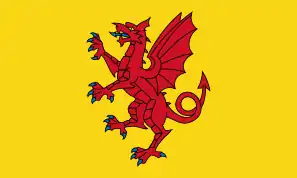England
England is the largest of the four countries which make up the United Kingdom. It is on the island of Great Britain.
England | |
|---|---|
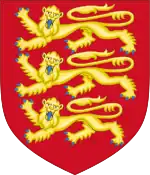 Coat of arms
| |
| Anthem: Various Predominantly ‘God Save the King’ (National anthem of the United Kingdom) and ‘Jerusalem’ | |
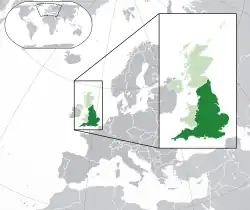 Location of England (dark green) – on the European continent (green & dark grey) | |
| Status | Country |
| Capital and largest city | London 51°30′N 0°7′W |
| National language | English |
| Regional languages | Cornish |
| Ethnic groups (2011) | |
| Religion | Church of England |
| Demonym(s) | English |
| |
| Government | Part of a constitutional monarchy, direct government exercised by the government of the United Kingdom[a] |
• Monarch | Charles III |
| Parliament of the United Kingdom | |
| • House of Commons | 533 MPs (of 650) |
| Legislature | UK Parliament[a] |
| Establishment | |
• Anglo-Saxon Unification of Angles, Saxons and Danes by Æthelstan | 12 July 927 |
| 1 May 1707 | |
| Area | |
• Land | 130,279 km2 (50,301 sq mi)[2] |
| Population | |
• 2019 estimate | |
• 2021 census | 56,490,048 |
• Density | 432/km2 (1,118.9/sq mi)[4] |
| GVA | 2018 estimate |
| • Total | £1.8 trillion |
| • Per capita | £33,000 |
| Currency | Pound sterling (GBP; £) |
| Time zone | UTC (Greenwich Mean Time) |
| UTC+1 (British Summer Time) | |
| Date format | dd/mm/yyyy (AD) |
| Driving side | left |
| Calling code | +44 |
| ISO 3166 code | GB-ENG |
Website gov.uk | |
Over 56.5 million people live in England (2021 estimate). This is 84% of the population of the United Kingdom.[4] The capital city of England is London. London is also the biggest city in the country. Other large cities in England are Birmingham, Liverpool, Manchester and Leeds.
The English flag is a red cross on a white background. This cross is the cross of Saint George, who is the patron saint of England. Some other symbols used for England are a red rose and three lions.
History
Although people had lived in England long before, it was a long time before the land was unified. The earliest known evidence of human presence in the area now known as England was that of Homo antecessor, about 780,000 years ago. The oldest proto-human bones discovered in England date to 500,000 years ago.
The Beaker culture arrived around 2,500 BC. They used drinking and food vessels made from clay, and vessels used as reduction pots to smelt copper ores. There was extensive Scandinavian trips to the islands around Scotland, and to Ireland, long before England was a unified country: check Skara Brae for one example.
Unification was first done by Æthelstan in 927 and Eadred in 953. A wave of Scandinavian attacks occurred from the late 10th century. They ended with the conquest of this united kingdom by Sweyn Forkbeard in 1013 and again by his son Cnut in 1016. This turned the country into the centre of a short-lived North Sea Empire which included Denmark and Norway. However, the native royal dynasty was restored with the accession of Edward the Confessor in 1042. When King Edward died, Harold Godwinson (the Earl of Wessex) became king. William the Conqueror, Duke of Normandy (today part of northern France), said that Harold had promised to make William the king. He invaded England and fought King Harold at the Battle of Hastings in 1066. William won, and became king of England.
Subsequently, the House of Plantagenet from Anjou inherited the English throne under Henry II, adding England to the budding Angevin Empire. They reigned for three centuries, some noted monarchs being Richard I, Edward I, Edward III and Henry V.
The period saw changes in trade and legislation, including the signing of Magna Carta, an English legal charter. Catholic monasticism flourished. The universities of Oxford and Cambridge were founded with royal patronage. The Principality of Wales became a Plantagenet fief during the 13th century and the Lordship of Ireland was given to the English monarchy by the Pope.
During the 14th century, the Plantagenets and the House of Valois both claimed to own the House of Capet and, with it, France. The two powers clashed in the Hundred Years' War. The Black Death epidemic hit England: starting in 1348, it killed up to half the population. From 1453 to 1487 civil war occurred between two branches of the royal family – the Yorkists and Lancastrians – known as the Wars of the Roses. Eventually it led to the Yorkists losing the throne entirely to Tudors. Henry Tudor invaded with Welsh and Breton mercenaries, won at the Battle of Bosworth Field where the Yorkist king Richard III was killed.
For several centuries the religion of England was Roman Catholicism. The bishops (church leaders) of England and all their churches obeyed the Pope and the church in Rome. During the Protestant Reformation many did not agree with this. In the 1530s, the Pope told King Henry VIII that he could not divorce his wife. Henry VIII made the Church of England (a "Protestant" church) partly so that he could divorce his wife. He made Protestantism the official church in England. For the next 200 years, there was struggle over whether the King (or Queen) of England should be Roman Catholic or Protestant.
Queen Elizabeth I was Henry's second daughter. She was a powerful queen who ruled for more than 40 years. Elizabethan England was the best of the English Renaissance and saw the flowering of art, poetry, music and literature. The era is most famous for its drama, theatre and playwrights. Queen Elizabeth I had no children.
In 1603 James VI of Scotland (the son of Mary, Queen of Scots) became King James I of England. He called his two countries "Great Britain", but they were still separate countries with their own parliaments and laws, even though they were in personal union because they shared the same monarch.
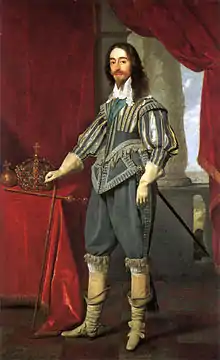
James' son, Charles I and the English Parliament fought each other in the English Civil War (Scotland and Ireland were involved as well, and the story is complicated!). Oliver Cromwell became leader of the Parliamentary Army (the "Roundheads") and defeated the Royalist Army (the "Cavaliers"). King Charles was beheaded in 1649 and Oliver Cromwell became dictator ("Lord Protector"). When Cromwell died, his son Richard was not strong enough to rule, and Charles II, the son of Charles I, was invited to come to England and be king in 1660.
When King Charles II died, his brother James II was the next king. A lot of people did not like James because he was Roman Catholic. William of Orange was invited to invade England.[5] He was the ruler of part of the Netherlands and husband of Mary, the daughter of King James. Many people welcomed William because he was a Protestant.
James left the country without a fight and Parliament asked William and Mary to become King and Queen together. When Mary II of England died, William ruled alone. Queen Mary's sister Anne became the next queen. While she was queen, England and Scotland were officially joined as one country. This was called the Acts of Union 1707. It also merged their separate parliaments. The parliament in London now included Scottish Members of Parliament ("MPs"), and was called the Parliament of Great Britain.
After this, the history of England becomes the history of Great Britain and United Kingdom. Under the newly formed Kingdom of Great Britain, the Royal Society and the Scottish Enlightenment created innovations in science and engineering. The enormous growth in British overseas trade protected by the Royal Navy paved the way for the British Empire. Domestically it drove the Industrial Revolution, which was a period of profound change in the socioeconomic and cultural conditions in England. Industrialised agriculture, manufacture, engineering and mining became important. New and pioneering road, rail and water networks helped the expansion and development.
The United Kingdom was formed in 1800, when the Irish Parliament merged with the British one. Later on, many in Ireland fought against this merger. The result was the separation of the Republic of Ireland. This is not the whole of Ireland. The rest of the island, Northern Ireland, is now the only part of Ireland still in the UK. England is the only country of UK not to have its own government, Parliament or Assembly, but is governed by the Parliament of the United Kingdom. Seats in Parliament are mostly decided by the number of electors in the various parts of the UK.
Geography
England is the largest part of the island of Great Britain, and it is also the largest constituent country of the United Kingdom. Scotland and Wales are also part of Great Britain (and the UK), Scotland to the north and Wales to the west. To the east and south, and part of the west, England is bordered by sea. France is to the south, separated by the English Channel. The Channel Tunnel, (Chunnel) under the English Channel, connects England to northern France (and the rest of mainland Europe). Ireland is a large island to the west, divided into Northern Ireland which is part of the United Kingdom, and the Republic of Ireland.
London is the largest city and the capital. The longest river in England is the River Severn. Other large rivers are the Thames (which runs through London), the Trent and the Humber. In geological terms, the Pennines, known as the "backbone of England", are the oldest range of mountains in England, originating from the end of the Paleozoic Era around 300 million years ago. Most of England's landscape consists of low hills and plains, with upland and mountainous terrain in the north and west of the country.
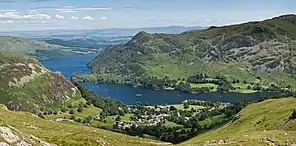
The English Lowlands are in the central and southern regions of the country, consisting of green rolling chalk hills, including the Cotswold Hills, Chiltern Hills, North and South Downs; where they meet the sea they form white chalk exposures such as the cliffs of Dover. This also includes relatively flat plains such as the Salisbury Plain, Somerset Levels, South Coast Plain. The Fens are the natural marshlands once widespread in various parts of England.
The United Kingdom is reducing greenhouse gas emissions. In 2019, the British Parliament became the first national government in the world to officially declare a climate emergency.
Achievements
England has been central to many aspects of the modern world. Global exploration and trade, the British Empire, modern science, modern agriculture, railways, the Industrial Revolution, the development of modern representative democracy. In all these developments England was deeply involved. In some of them, such as the Industrial Revolution, England was the place where modern developments first occurred.
The Royal Society is a society for science and scientists. It was founded in 1660 by Charles II. It is the oldest society of its kind still in existence.
Language
The English language is a West Germanic language spoken in many countries around the world. With around 380 million native speakers, it is the second most spoken language in the world, as a native language. As many as a billion people speak it as a second language. English is an influence on, and has been influenced by, many other languages.
William Shakespeare was an English playwright. He wrote plays in the late 16th century. Some of his plays were Romeo and Juliet and Macbeth. In the 19th century, Jane Austen and Charles Dickens were novelists. Twentieth century writers include the science fiction novelist H.G. Wells and J.R.R. Tolkien. The children's fantasy Harry Potter series was written by J.K. Rowling. Aldous Huxley was also from the United Kingdom.
English language literature is written by authors from many countries. Eight people from the United Kingdom have won the Nobel Prize in Literature.
Climate
All of Great Britain has an oceanic climate. There can be a temperature difference of 5–10°c between the north and the south (the north is generally colder), and there is often snow in the north before there is in the south.
The prevailing wind for most of the year is from the Atlantic, to the west of England. Therefore, there is more rain on the western side of the country. The east is colder and drier than the west. The country usually has a mild climate because the Gulf Stream to the western side is warm water. The climate is warmer than it was 200 years ago, and now ice and snow are rare in the southern part of the country. Occasionally, air from the Arctic Circle comes down the eastern side of the country and the temperature can drop below 0oC.
Politics
.svg.png.webp)
As part of the United Kingdom, the basic political system in England is a constitutional monarchy and parliamentary system. It has a monarch (meaning a king or queen is the head of that country). The head of state is King Charles III, who is became King of the United Kingdom of Great Britain and Northern Ireland upon his Mother's death on 9/8/2022, after her historical 70-year reign. The House of Commons is the lower house of the British Parliament in the Palace of Westminster. There are 532 Members of Parliament (MPs) for constituencies in England, out of the 650 total.
The English people are represented by members of Parliament, not ruled by monarchs. After the English Civil War, Oliver Cromwell became Lord Protector, and the monarchy was disbanded. Although the monarchy was restored after his death, the Crown slowly became the secondary power, and Parliament the first. Members of Parliament (called MPs) were elected, but until the early twentieth century, only men who owned property could vote. In the nineteenth century, more people were given suffrage. But in 1928, all men and women got the vote: this is called "universal suffrage". Parliament is in Westminster in London, but it has power over the whole of the United Kingdom.
Almost all members of Parliament belong to political parties. The biggest parties are the Conservative Party, Labour Party, Liberal Democrats and Green Party. Members of the same party agree to act and vote more or less together. A party with more than half the seats (a majority) forms the government; the leader of the party becomes the Prime Minister, who then appoints other ministers. Because the government has a majority in Parliament, it can normally control what laws are passed.
Economy
England has a mixed market economy. It has adopted many free market principles, yet has an advanced social welfare infrastructure. The official currency in England is the pound sterling, which is the oldest currency in use. England is a leader in the chemical and pharmaceutical sectors and in key technical industries, particularly aerospace, the arms industry, and the software industry.
London is home to the London Stock Exchange, the United Kingdom's main stock exchange and the largest in Europe. It is England's financial centre, with 100 of Europe's 500 largest corporations being based there. London is the largest financial centre in Europe, and as of 2014 is the second largest in the world. Manchester is the largest financial and professional services sector outside London and is the mid tier private equity capital of Europe as well as one of the growing technology hubs of Europe.
Major conurbations
The Greater London Built-up Area is by far the largest urban area in England and one of the busiest cities in the world. It is considered a global city and has a population larger than any other country in the United Kingdom besides England itself.
Other urban areas of considerable size and influence tend to be in northern England or the English Midlands. There are 52 settlements which have designated city status in England, while the wider United Kingdom has 70. City status in England is granted by the monarch to a select group of communities.
While many cities in England are quite large, such as Birmingham, Sheffield, Manchester, Liverpool, Leeds, Newcastle, Bradford, Nottingham, population size is not a prerequisite for city status. Traditionally the status was given to towns with diocesan cathedrals, so there are smaller cities like Wells, Ely, Ripon, Truro and Chichester.
Education
State primary schools and secondary schools exist. These consist of academy schools, community schools, sixth form colleges, further education colleges, grammar schools, foundation schools, faith schools, free schools, studio schools, university technical colleges and city technology colleges. The most common specialist schools are performing arts schools, science schools, maths schools, business schools and technology schools.[6] Independent public or prep schools also exist. Eton College and Harrow School are the best known independent schools.
_005.jpg.webp)
The National Curriculum was introduced in 1988, to give pupils a broad and balanced curriculum. The school curriculum aims to promote the spiritual, moral, cultural, mental and physical development of pupils. Its purpose is to prepare them for the opportunities, responsibilities and experiences of later life.[5]
Many prominent people who have reached the top in their fields have been products of English higher education. There have been universities in England since the Middle Ages. Ancient universities started in this time and in the Renaissance. The two oldest and most prestigious universities are Oxford University and Cambridge University. Imperial College, University College London and Manchester University are also highly rated by independent lists. There are now about a hundred universities.
Transport
Road traffic in the U.K. drives on the left hand side of the road (unlike the Americas and most of Europe). The driver sits on the right hand side of the vehicle. The road network on the island of Great Britain is extensive, with most main roads dating from Roman and medieval times. The system of motorways is more modern.
The system of rail transport was invented in England, so it has the oldest railway network in the world. It was built mostly during the Victorian era. The extensive railway network covers the entire country. The system of underground railways in London, known as the Tube, has been copied by many other cities around the globe. England is home to the largest airport and is one of the most important international hubs in the world. A system of motorways for road transport exists between some major cities.
Media
The BBC broadcasts in the United Kingdom and other countries on television, radio and the Internet. The BBC also sells its programmes to other broadcasting companies around world. The organisation is run by a group of twelve governors who have been given the job by the King, on the advice of government ministers. The BBC is established under a royal charter, which allows the BBC to broadcast.
National newspapers produced in England include The Times, The Guardian, The Daily Telegraph and the Financial Times. Magazines and journals published in England that have achieved worldwide circulation include Nature, New Scientist, The Spectator, NME and The Economist.
English culture
See English literature, English Heritage, Aldeburgh Festival, The Royal Society
English culture can be compared with Northern European countries. Humour, tradition and good manners are characteristics commonly associated with being English.
Sport
England has a strong sporting heritage, and during the 19th century codified many sports that are now played around the world. Sports originating in England include association football, cricket, rugby union, rugby league, tennis, boxing, badminton, squash, rounders, hockey, snooker, billiards, darts, table tennis, bowls, netball, thoroughbred horseracing, and greyhound racing. It has helped the development of golf, sailing and Formula One car racing.
Despite having invented the game, The English football team only won the World Cup in 1966. They came close in Italy 1990, losing in the semi-final against West Germany on penalties. The England women's national football team won the UEFA Euro 2022. After winning the 2019 Cricket World Cup, England became the first country to win the World Cups in football, rugby union and cricket.[7]
English people invented:
People from England
There are many well known English people. Here are just a few of them:
- Geoffrey Chaucer (1343–1400), poet
- William Shakespeare (1564–1616), playwright, poet
- Sir Christopher Wren (1632–1723), architect
- Sir Isaac Newton (1642–1727), mathematician and physicist
- King Henry VIII, founder of the Church of England
- John Wesley, founder of the Methodist Church
- Joseph Mallord William Turner (1775–1851), landscape and marine artist
- John Constable (1776–1837), landscape painter
- Jane Austen (1775–1817), novelist, Pride and Prejudice
- William Wordsworth (1770–1850), poet
- Michael Faraday (1791–1867), discoverer of electromagnetism
- Charles Dickens (1812–1870), writer
- Isambard Kingdom Brunel (1806–1859), engineer
- Charles Darwin (1809–1882), biologist, natural selection and The Origin of Species
- Joseph Bazalgette (1819 –1891), engineer and architect of drinkable water
- J.J. Thomson (1856–1940), physicist
- Howard Carter (1874–1939), archaeologist (Egypt)
- Sir Winston Churchill (1874–1965), twice Prime Minister, led country during World War II
- J.R.R. Tolkien (1892–1973), author and scholar, The Lord of the Rings
- Francis Crick (1916–2004), co-discovery of the structure of DNA
- Sir Tim Berners-Lee, inventor of the World Wide Web
- The Beatles, musical group: (1962–1970)
- Led Zeppelin, rock band
- The Rolling Stones, rock band
- Diana, Princess of Wales (1961–1997)
- Margaret Thatcher (1925–2013), Prime Minister 1979–1990
- Sir Stanley Matthews (1915–2000), footballer, 1956 Ballon d'Or winner
- Bobby Moore (1941–1993), footballer, captain of the England team that won the 1966 FIFA World Cup.
- Sir Bobby Charlton, footballer, 1966 Ballon d'Or winner
- Lewis Hamilton, Formula 1 driver and world champion 2008, 2014, 2015, 2017, 2018, 2019, 2020
- Amy Winehouse (1983–2011), singer
- Stephen Hawking (1942-2018), theoretical physicist
Divisions
England is divided into 48 ceremonial counties, which are also known as geographic counties. The counties of England are areas used for different purposes, which include administrative, geographical, cultural and local politics. The original county structure has its origins in the Middle Ages. The historic counties of Yorkshire, Cumberland, Westmorland, Huntingdonshire and Middlesex are the five defunct ceremonial counties which were historically counties.
Yorkshire is divided into the East Riding of Yorkshire, North Yorkshire, South Yorkshire and West Yorkshire, Cumberland and Westmorland were combined with a former exclave of Lancashire to form Cumbria, Huntingdonshire merged into Cambridgeshire, and most of Middlesex became part of Greater London.
There is no well-established series of official symbols or flags covering all the counties. From 1889 the newly created county councils could apply to the College of Arms for coats of arms. A recent series of flags, with varying levels of official adoption, have been established in many of the counties by competition or public poll. County days are a recent innovation in some areas. There are seventeen first-class county cricket teams that are based on historical English counties.
Related pages
References
- "2011 Census: KS201EW Ethnic group: local authorities in England and Wales". Office for National Statistics. Retrieved 18 April 2014.
- Region and Country Profiles, Key Statistics and Profiles, October 2013, ONS. Retrieved 9 August 2015.
- "Population estimates for the UK, England and Wales, Scotland and Northern Ireland – Office for National Statistics". www.ons.gov.uk.
- Jonathan, McMullan (28 June 2018). "Population estimates for UK, England and Wales, Scotland and Northern Ireland". www.ons.gov.uk. Office for National Statistics.
- Colley, Linda 1992. Britons: forging the nation, 1701–1837. Yale University Press. ISBN 978-0-300-05737-9
- "Types of school". GOV.UK. Retrieved 1 July 2022.
- "England 1st country to win Cricket World Cup, Football World Cup and Rugby World Cup". India Today. Retrieved 15 July 2019.

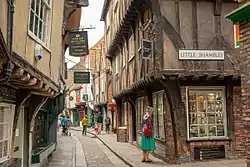
.jpg.webp)


